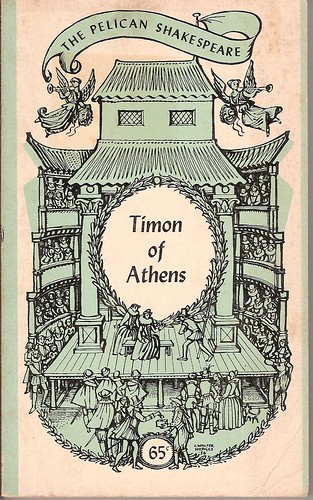Titus Andronicus: I couldn't stop thinking about Titus when I saw Django Unchained last week. Both are revenge narratives--the revenge aspect of Django I won't go into needlessly here (you can read the plot summary on IMDB) but Titus gets his revenge on the Goth queen Tamora, her Moorish companion Aaron, and her sons Chiron and Demetrius, who have raped Titus' daughter Lavinia and killed his step-brother with the aid of the other two. Shakespeare plumbs the sordid depths of folklore and myth to cobble this plot together, but he feels compelled to outdo his sources: Like in the story of Philomel, the brothers rip out Lavinia's tongue so that she cannot identify them as the perpetrators, but for good measure they cut her hands off as well.
Since Tamora is seeking revenge in turn for Titus' sacrifice of her son as a prisoner of war, it is possible Shakespeare is making some commentary on the cyclical, all-devouring nature of revenge. Yet, it seems plain that the greatest joy of seeing Titus performed is to watch the brutality of each escalating incident of vengeance, which I think reduces the power of that commentary. It reminds me too much of Django, which I thought was entertaining but fundamentally shallow. It is a rare Shakespearean play where the fun is in the spectacle, not the language, which is really devoid of anything interest except for what comes out of the mouth of Aaron, more eloquent than his Roman masters. Here he is determined to protect the child he has with Tamora from Chiron and Demetrius, though the child's skin tone gives reveals their intimacy:
What, what, ye sanguine, shallow-hearted boys,
Ye whitelimed walls, ye alehouse painted signs,
Coal-black is better than another hue,
In that it scorns to bear another hue;
For all the water in the ocean
Can never turn the swan's black legs to white
Though she lave them hourly in the flood.
Timon of Athens: I am convinced by those who contend this play is not finished; it was never performed, and it has a strange raggedness. That's a shame, because it's really fascinating. Timon is a wealthy patron in Athens, noted for his generosity, but when he finally runs into debt he finds that all of his former "friends" have abandoned him. Disgusted, he leaves Athens in self-exile and wanders around the forest heaping scorn on all mankind.
Timon's about-face is too exaggerated and compressed to be convincing; he never quite becomes a human being. Yet, his long rants against Athens and all of humanity are a lot of fun, and some of Shakespeare's most bitter and ornate poetry. I particularly like when Timon, digging for roots to sustain himself, accidentally digs up the last thing he wants--gold:
What is here?
Gold? Yellow, glittering, precious gold?
No, gods, I am no idle votarist:
Roots, you clear heavens. Thus much of this will make
Black white, foul fair, wrong wright,
Base noble, old young, coward valiant. Why this, what, this, you gods? Why, this
Will lug your priests and servants frm your sides,
Pluck stout men's pillows from below their heads.
This yellow slave
Will knit and break religions, bless th'accursed,
Make the hoar leprosy adored, place thieves,
And give them title, knee, and approbation
With senators on the bench.
A Midsummer Night's Dream: I have been saying for years that the freshmen where I teach should read A Midsummer Night's Dream instead of Romeo and Juliet. They read one tragedy a year, and come away with the idea that all Shakespeare is murder, suicide and madness. (Plus, Romeo and Juliet is 30-40% penis jokes.) Midsummer, on the other hand, is a lot of fun, and what's more, it's the only play of Shakespeare's that I would actually call funny. The inept play the Mechanicals put on for the noble characters at the play's end never fails to crack me up in its badness:
BOTTOM [as Pyramus]: Thus die I: thus, thus, thus.
[He stabs himself]
Now am I dead,
Now am I fled,
My soul is in the sky.
Tongue, lose thy light;
Moon, take thy flight.
Now die, die, die, die, die.
I'm actually laughing as I write this. Although, maybe my freshmen wouldn't really get the humor--they might think this is the most moving passage in the play, and post it on their tumblrs. Of course, Midsummer also offers the really fantastic scenes where Puck transforms Bottom's head into that of an ass, and then gives the Fairy Queen Titania a potion which makes her fall in love with him. People have been doing cheap transformation scenes for hundreds of years, and they're always the same: Michael J. Fox stares into the mirror, his hair, nails and teeth start to grow, and he screams. OH NO, I'M A TEEN WOLF. Shakespeare, five hundred years ago, gave us the most original and amusing take on transformation scenes; Bottom just rolls with it, unfazed by it all, not noticing he's changed, and not being in the least shocked that a Fairy Queen wants to get her bone on with him. The rest of the scattershot plot is all great, but it's the Bottom scenes that really elevate this, for me, to one of Shakespeare's greatest works.
EDIT: I accidentally wrote that Tamora's sons kill Lavinia, when in fact they only rape and mutilate her. Titus himself kills Lavinia, in fact, out of either shame or an overflow of vengeful feelings.

.jpg/250px-Titus_Q3_(1611).jpg)


1 comment:
I saw this performed and so far, it's the best live Shakespeare performance I've seen (R&J is second). I really liked what Rosenblum had to say about Midsummer Night's Dream in The Shakespeare Wars. Helped me appreciate the non-comedic aspects of the play more.
Post a Comment